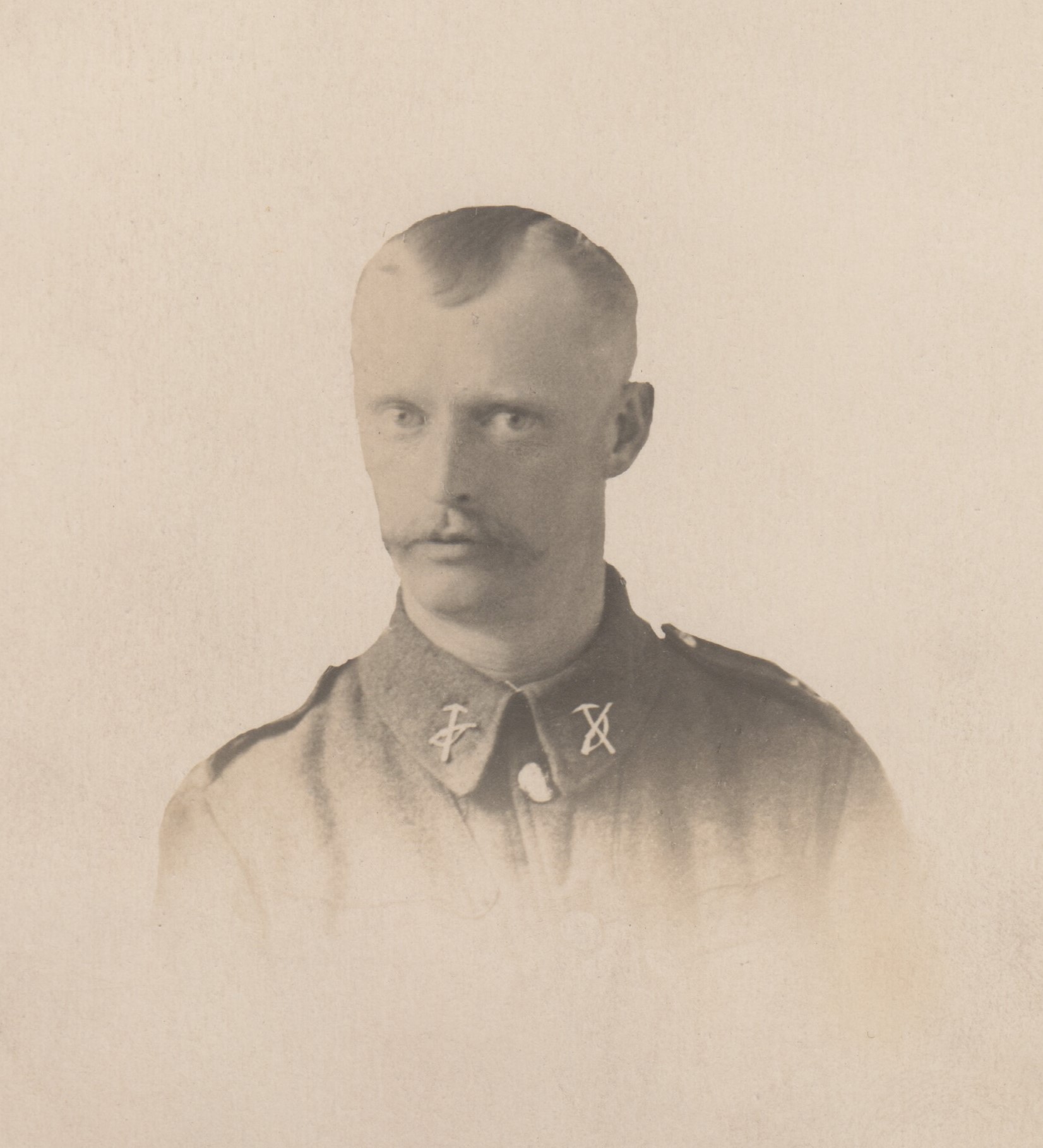
Edward was the Great Uncle of Robert Raw and Margaret Hird, who visited the museum during one of our Ribbon of Remembrance drop-in days.
Edward, born in Richmond (he lived for at time along Frenchgate and then at 3 Maison Dieu) worked as a plumber for the North Eastern Railway, and enlisted after the outbreak of war in York.
He became a Private in the 17th (Service) Battalion (NER Pioneers), a group whose skills were vital in constructing and maintaining the railways that developed behind the lines which kept the troops equiped and fed for the duration of the war. Edward was killed on 2nd November 1917, during the period where the battalion were working on light railways in the Ypres sector and suffered from shrapnel and gas shelling as well as high-explosives.
Edward Barker is buried in Bard Cottage Cemetery, Belgium.

Explore more memories from the ribbon
-
Albert Victor Taylor
Submitted by David Taylor. Albert Victor Taylor was my great uncle. He was born in Middlesbrough in 1897, the son of Thomas and Margaret Taylor (nee Hill). At the age of 3 in 1901 he was living at 119, Barritt Street, Middlesbrough with his father, a steam engine fitter and his mother. By 1911 the family were living at 19, Haddon Street, Middlesbrough and Albert Victor’s Occupation was an errand boy for a leather merchant. Like many others in his age group Albert Victor Taylor followed the call to join the Colours. He became a private in 1/5th Battalion Alexandra Princess of Wales’s Own Yorkshire Regiment. His service number was 241492 and he was killed in action at Berny-en-Santerre in France on March 3rd 1917. His name is inscribed on the Thiepval Memorial.
-
K R Henderson
Kenneth Henderson was born on the 29th May 1895 at Sutton in Surrey, the third and youngest child of Robert and Janie Henderson. His father was a bank manager. The family were quite reasonably well off as the 1911 census shows the family having 3 servants. By this time Kenneth was at Charterhouse School. His early life is undocumented. On the outbreak of WW1 Kenneth enlisted in the 28th Battalion, The London Regiment (Artists’ Rifles). This was a popular unit for volunteers and a number would be selected to be officers in other Regiments, as Kenneth would be. On the 26th October he landed in France with the Artists’ Rifles and on the 15th March 1915 was made temporary 2nd Lieutenant with the 2nd Battalion, Yorkshire Regiment. During 1915 he saw action with the 2nd Battalion at Fromelles, Festuber and Givenchy. On the 7th July 1916 during the Somme offensive he received his fourth wound of the war. After the war he was with the newly reconstituted 6th Battalion, Yorkshire Regiment, for service in the Russian Archangel campaign. It was here that he received the Military Cross. The London Gazette of the 21st January 1919 read: ‘He has carried out the duties of a Company Commander of a mixed force at Bolshe-Ozerki and has worked in a very efficient way. He has had continuous service on this front since November 1918 and in four engagements in which his company has taken part he has proved to be a fearless and…
-
Ernest Brooke
Sgt. Ernest Brooke was born in Brighthouse, Yorkshire in 1886. In civilian life Ernest worked a railway signalman. Ernest’s medal records show he was entitled to the 1914 Star indicating that he was an ‘Old Contemptible’, part of the original British Expeditionary Force that fought in France and Belgium from August 1914. Ernest served with the 2nd Battalion of the Yorkshire Regiment until his death on 4th January 1918. The New Year 1918 that at 11pm (German midnight) on the 31st December 1917, ‘…all guns of artillery fired one round each, whilst machine guns fired two belts of ammunition each ‘to usher in the new year’. The following day, the 2nd Battalion were relieved from the front line and relocated to ‘Hedge Street Tunnels’. On the night of the 4th of January, a fire broke out in the area of the tunnel being occupied by the Battalion, resulting the loss of a further 20 lives from the 2nd Battalion – one of those lives being Ernest Brookes’. In accordance with his wishes, Ernest’s outstanding pay and War Gratuity, totalling £29, 7shillings and 19d to his mother, Hannah.
